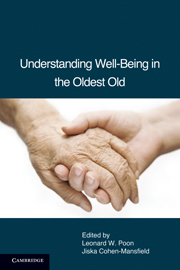Book contents
- Frontmatter
- Contents
- List of Tables
- List of Contributors
- Foreword by Carol D. Ryff
- PART I THEORY: NEW HORIZONS IN WELL-BEING RESEARCH
- PART II PARADISE LOST: BETWEEN TRAUMA AND HAPPINESS
- PART III PATHWAYS AND GATEKEEPERS: MODERATING, MEDIATING, AND PROXIMAL PROCESSES
- 9 Impact of Resources on Successful Adaptation among the Oldest Old
- 10 Nutrition and Well-Being
- 11 Cognitive Functioning and Vitality among the Oldest Old: Implications for Well-Being
- 12 Social Relationships and Well-Being in Very Late Life
- 13 Spirituality and Religiosity Connections to Mental and Physical Health among the Oldest Old
- 14 The Impact of Leisure Activity and Innovation on the Well-Being of the Very Old
- PART IV SIGNPOSTING PARADISE: MEASUREMENT OF WELL-BEING
- Index
- References
9 - Impact of Resources on Successful Adaptation among the Oldest Old
Published online by Cambridge University Press: 05 August 2012
- Frontmatter
- Contents
- List of Tables
- List of Contributors
- Foreword by Carol D. Ryff
- PART I THEORY: NEW HORIZONS IN WELL-BEING RESEARCH
- PART II PARADISE LOST: BETWEEN TRAUMA AND HAPPINESS
- PART III PATHWAYS AND GATEKEEPERS: MODERATING, MEDIATING, AND PROXIMAL PROCESSES
- 9 Impact of Resources on Successful Adaptation among the Oldest Old
- 10 Nutrition and Well-Being
- 11 Cognitive Functioning and Vitality among the Oldest Old: Implications for Well-Being
- 12 Social Relationships and Well-Being in Very Late Life
- 13 Spirituality and Religiosity Connections to Mental and Physical Health among the Oldest Old
- 14 The Impact of Leisure Activity and Innovation on the Well-Being of the Very Old
- PART IV SIGNPOSTING PARADISE: MEASUREMENT OF WELL-BEING
- Index
- References
Summary
ABSTRACT
This chapter analyzes the influences of resources on Georgia centenarians' well-being, considering social interactions, caregiving services, and economic resource adequacy in context of other resources and constraints such as personality, cognitive ability, and functional limitations. We compare the well-being effects of proximal resources to those for distal resources and major life events. Both subjective (hedonic) and psychological (eudaimonia) well-being are analyzed. Subjective mental health is primarily related to perceived economic resources that are associated with distal resource indicators (education, ethnicity) so that centenarians can maintain a positive mental outlook despite functional limitations because their resources buffer economic anxiety. Their social interactions enhance the social provisions dimension of subjective well-being. However neither social nor economic resource adequacy influences the autonomy and growth aspects of psychological well-being, whereas personality resources are critical for that kind of adaptation.
INTRODUCTION
Previous research on the social and economic resources of centenarians and other very old individuals has demonstrated that oldest-old adults manage to maintain a fair to good level of well-being despite deficits in their functional health, cognition, and the threat of depleting personal economic resources as a result of extreme longevity (Pinquart & Sörenson, 2000); see Chapter 3 for further discussion of evidence that subjective well-being does not necessarily decrease in extreme age.
- Type
- Chapter
- Information
- Understanding Well-Being in the Oldest Old , pp. 151 - 170Publisher: Cambridge University PressPrint publication year: 2011
References
- 1
- Cited by



